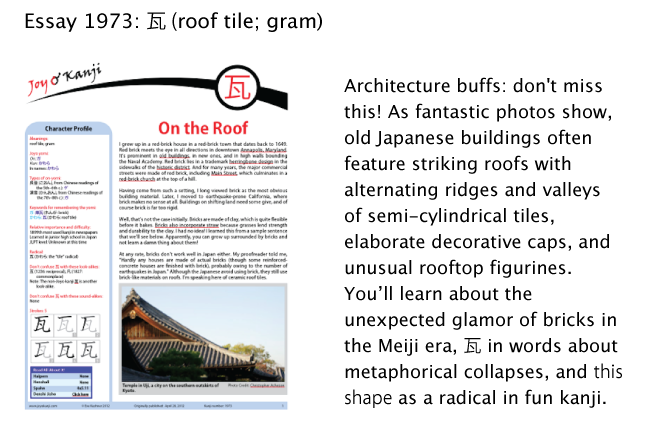Against All Odds
The following word looks quite simple, but that's not the case!
一分
It has three yomi and three meanings. Do you know what they are? I'll block the answers with a photo I took on a road trip to the Monterey/Carmel area last weekend.

Photo Credit: Eve Kushner
Iceplant above Monterey Bay.
With the yomi of いっぷん, 一分 means "one minute."
As いちぶん, this compound means "duty, honor." This old yomi was nearly obsolete but has experienced a revival, thanks to a 2006 movie called 武士の一分 (ぶしのいちぶん).
In addition, 一分 can be いちぶ. Even when we've narrowed it down to that possibility, the meaning remains unclear. That's because with the yomi of ブ, 分 can mean either "1 percent" or "10 percent"! Which one it is depends on the context.
Here's an example:
五分五分 (ごぶごぶ: as likely as not; even; 50–50)
In this word 分 means "10 percent" each time. When you combine 五 (five) with 分 (10%), you have 50 percent. And when you double that in 五分五分, you should have 100 percent, but that's not what's going on here! Instead, you use 五分五分 to say that there's a 50–50 chance that things will turn out one way or the other. The movie 50–50 comes to mind; the character has equal odds of surviving cancer or succumbing to it.
You could also use 五分五分 to talk about an evenly split record in sports:
山田君との対戦成績は5分5分だ。
Yamada and I are even. We've beaten each other an equal number of times.
山田 (やまだ: surname); -君 (-くん: suffix meaning "Mr.");
対戦成績 (たいせんせいせき: win-loss records (between two people or teams))
Whenever people discuss the milling of rice (how specific!!!), 分 again means "10 percent." An example:
一分搗き最高級コシヒカリ玄米
top-quality Koshihikari brown rice milled (only) 10 percent
一分 (いちぶ: 10 percent); 搗き (づき: polished rice);
最高級 (さいこうきゅう: top-quality); コシヒカリ (brand of rice); 玄米 (げんまい: brown rice)
In the following set phrase, which is about the odds that something will happen, 分 again means "10 percent":
九分九厘 (くぶくりん: 99 percent)
The odds are apparently very good! In this expression, 九分 means "90 percent," and 九厘 is "9 percent." Incidentally, 厘 (1913) means "1 percent" or "one-hundredth." Nevertheless, this character once stood for one-thousandth of a yen. What would that be worth now?!
At any rate, 分 means "10 percent" in all those cases.
Now let's look at another way of saying that the odds are 99 percent:
九割九分 (きゅうわりきゅうぶ: 99 percent)
The 分 has shifted to a lower position! Whereas 割 conveys "10 percent" (making 九割 represent "90 percent"), this 分 means just "1 percent."
Here's the rule of thumb:
In combination with 割, 分 means "1 percent."
Well, actually, that's the second rule of thumb. Here's the first one:
If you're talking about milled rice, 分 means "10 percent"!
What if you're discussing baseball? There the 1 percent rule seems to apply because 割 swings into action. Check this out:
3割4分3厘 (さんわりよんぶさんりん: .343 (batting average))
Here we have 割 as "10 percent," 分 as "1 percent," and 厘 as ".1 percent."
Wait! In 九分九厘, we saw 厘 as "1 percent." Now its value has fallen to .1 percent! It's always one-hundredth of 割 if they're in the same expression.
Who thought of this craziness?!?!?! What are the odds that we can ever interpret these kanji correctly?!

Photo Credit: Eve Kushner
Frustrated monkey in carving at Toshogu Shrine in Nikko.
If it's any consolation, my proofreader says, "I understand your confusion, as it confuses us, too. "
Okay, I just thought of a way to make some sense of this. Imagine that 割, 分, and 厘 are siblings, eldest to youngest, respectively. Think of 割 as a bullying brother, one who makes everyone else nervous. When 割 is around, he naturally takes the top slot of 10 percent, and everyone else is subordinate to him:
| 10% | 1% | .1% | .01% | |
| 割 | 分 | 厘 | 毛 |
But when he leaves the room, everyone breathes a sigh of relief, feeling less oppressed. Then 分 can be in charge and acquires the top value of 10 percent, while 厘 slides into the vacant 1 percent position:
| 10% | 1% | .1% | |
| 分 | 厘 | 毛 |
Note that we've added another sibling to the family: 毛. Ordinarily, it has the yomi of モウ or け and means "hair." But in this context of percentages, it goes by its on-yomi of モウ and is worth just one-thousandth of 割!
Actually, Wikipedia says there are about 20 decimal units to follow 毛! For instance, after 毛 comes 糸 (し), but it's in no way in practical use.
Oh, and now I've connected this pattern with something I wrote in essay 1973 (瓦), which has just come out today. That is, 瓦 serves as a radical in some fascinating non-Joyo kanji, all of which represent tiny measurements:
瓰 (デシグラム: decigram; 1/10 gram)
甅 (センチグラム: centigram; 1/100 gram)
瓱 (ミリグラム: milligram; 1/1000 gram)
I like thinking that someone selected 毛 for this kanji not only because 毛 means "1/1000" but also because a hair could weigh as little as a milligram. Of course I have no idea how much a single hair weighs, but my proofreader agrees that “it’s not very difficult to imagine that ‘hair’ is connected to ‘very little, hardly any.’”
Am I just splitting hairs with all this micro-analysis? How much does a split hair weigh?!
Here's a preview of the essay:

Have a great weekend!

Comments